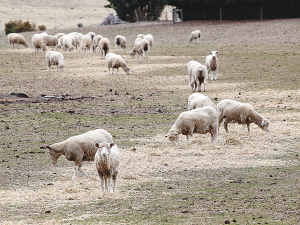Hawke’s Bay sheep and beef farmers warned to monitor stock water wells
Sheep and beef farmers in Hawke's Bay are being urged to keep a close eye on the wells that supply water to their stock.
 Destocking may seem like the best option for some Marlborough farmers, says farmer Warwick Lissaman.
Destocking may seem like the best option for some Marlborough farmers, says farmer Warwick Lissaman.
Seddon farmer and Marlborough drought committee member Warwick Lissaman says total destocking and going fishing may seem like the best option for some of Marlborough’s drought-hit farmers.
“But as an industry, we can’t do that. As a whole community, we can’t do that. We have to fight through,” he told Rural News.
Speaking following a recent well-attended drought meeting at Ward, Lissaman says farmers’ needs varied case by case. For some, it’s about personal support and relationship issues, and for others very much just animal feed and water.
He adds that some have too many animals for the feed they have, and some have feed but no water because stock water dams have had no infill for two years.
Farmers are facing extremely low pasture growth rates – zero to five kg of dry matter per hectare per day – so can’t “just fiddle” with the stock numbers, he says.
“You can’t just come down to 50% and still make it work.”
Lissaman says many farmers were at between 40% to 60% of their expected stock numbers at this time of the year, but will still be short of feed if there’s no rain-fed growth in May and June.
“You can’t de-stock the whole East Coast region by 80% for example and place those animals anywhere, to then bring them back. There just isn’t anywhere for them to go.”
For Marlborough, the worst-hit area is the Flaxbourne River catchment around Ward.
Lissaman says his own farm, near Seddon, is on the cusp of the really dry area. However, he says the drought hit home to him about a week ago when he realised some of his driest slopes had gone a grey colour, meaning the dry grass cover was now so thin that he was seeing the soil underneath.
“I haven’t had to graze those areas and I still haven’t grazed them but they’ve gone grey without me grazing them.”
In a normal summer they would go golden or bleach to white but then go green when the rains came, he says.
New DairyNZ research will help farmers mitigate the impacts of heat stress on herds in high-risk regions of the country.
Budou are being picked now in Bridge Pā, the most intense and exciting time of the year for the Greencollar team – and the harvest of the finest eating grapes is weeks earlier than expected.
The Real Estate Institute of New Zealand (REINZ) has released its latest rural property report, providing a detailed view of New Zealand’s rural real estate market for the 12 months ending December 2025.
Rural retailer Farmlands has released it's latest round of half-year results, labeling it as evidence that its five-year strategy is delivering on financial performance and better value for members.
OPINION: "We are back to where we were a year ago," according to a leading banking analyst in the UK, referring to US president Donald Trump's latest imposition of a global 10% tariff on all exports into the US.
DairyNZ says the Government’s proposed Resource Management Act reform needs further work to ensure it delivers on its intent.

OPINION: A mate of yours truly reckons rural Manawatu families are the latest to suffer under what he calls the…
OPINION: If old Winston Peters thinks building trade relations with new nations, such as India, isn't a necessary investment in…